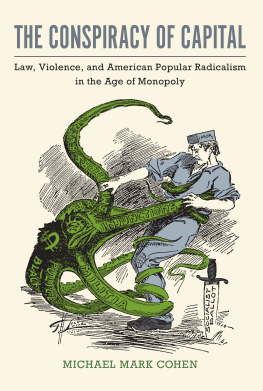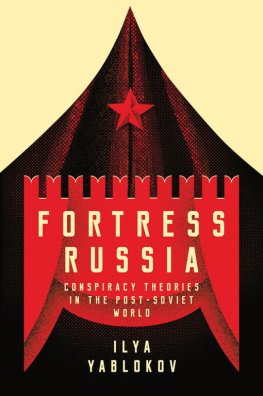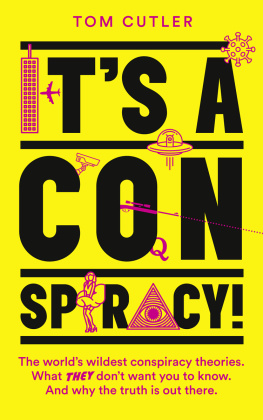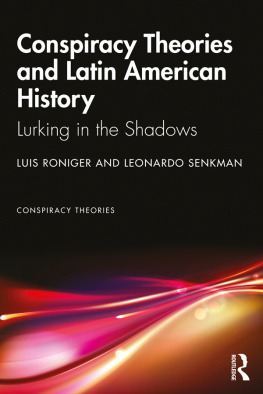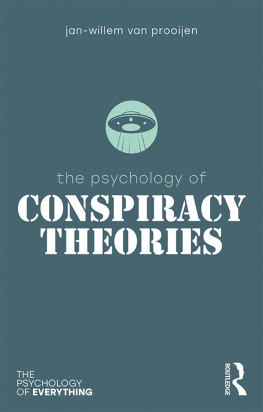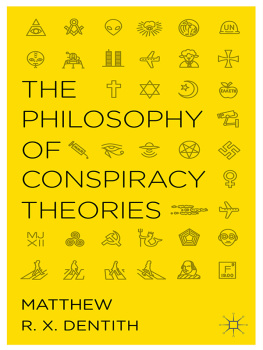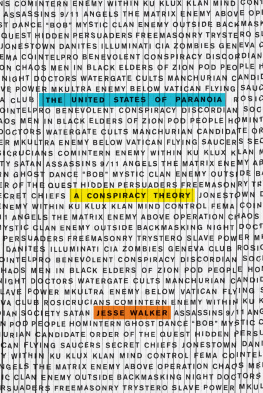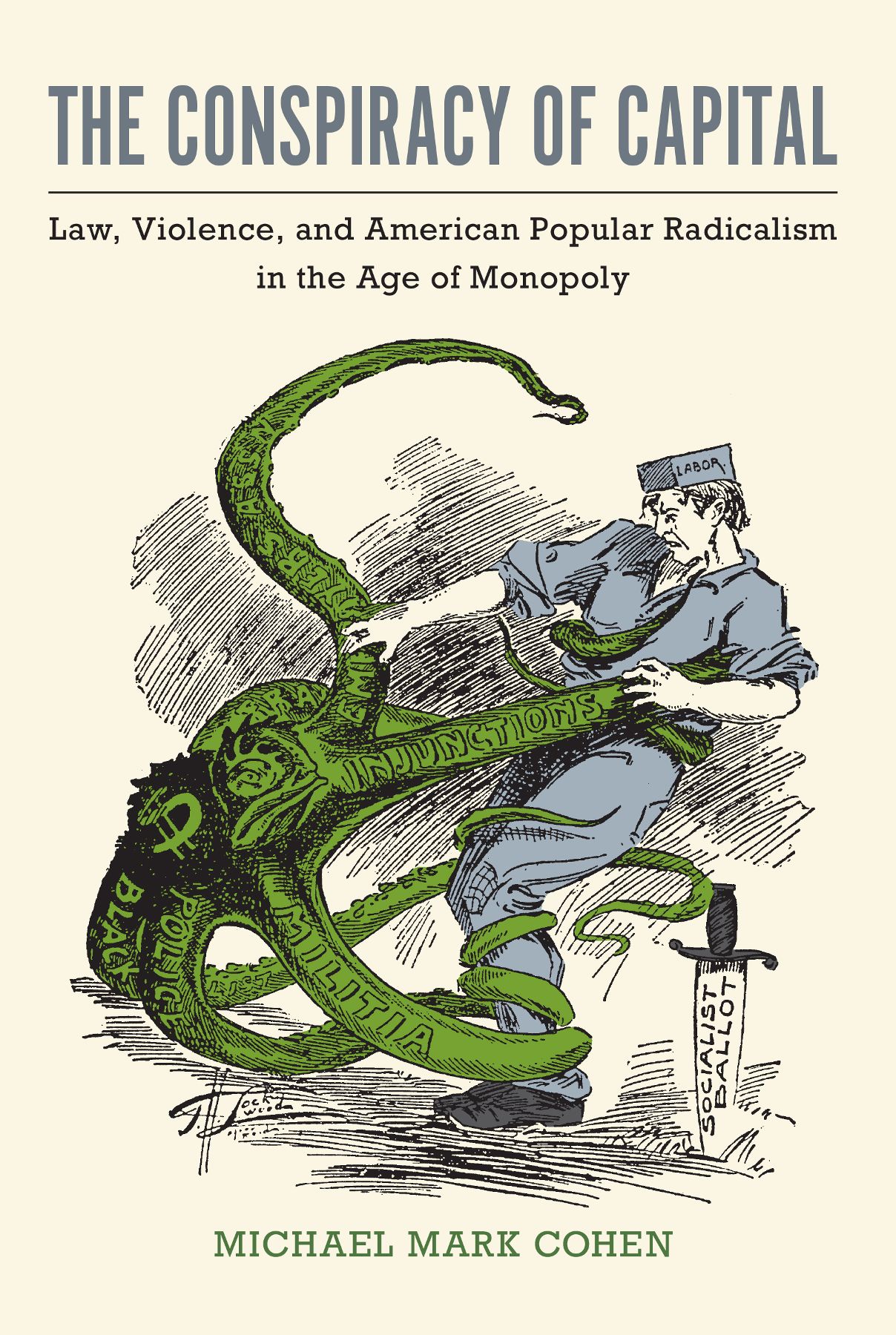
The Conspiracy of Capital
The Conspiracy of Capital
Law, Violence, and American Popular Radicalism in the Age of Monopoly
Michael Mark Cohen
University of Massachusetts Press
Amherst and Boston
Copyright 2019 by University of Massachusetts Press
All rights reserved
ISBN 978-1-61376-649-1 (e-book)
Printed in the United States of America ISBN 978-1-62534-401-4 (paper); 400-7 (hardcover) Designed by Deste Roosa Set in Minion Pro and Rockwell Printed and bound by Maple Press, Inc.
Cover design by Frank Gutbrod
Cover art by T. H. Lockwood, Appeal to Reason, January 9, 1904.
Library of Congress Cataloging-in-Publication Data
Names: Cohen, Michael Mark, author.
Title: The conspiracy of capital : law, violence, and American popular radicalism in the age of monopoly / Michael Mark Cohen.
Description: Amherst : University of Massachusetts Press, [2019] | Includes bibliographical references and index. |
Identifiers: LCCN 2018051546 (print) | LCCN 2018054895 (ebook) | ISBN 9781613766484 (ebook) | ISBN 9781613766491 (ebook) | ISBN 9781625344007 (hardcover) | ISBN 9781625344014 (pbk.)
Subjects: LCSH: RadicalismUnited StatesHistory. | ConspiraciesUnited StatesHistory. | CapitalismSocial aspectsUnited StatesHistory. | Political violenceUnited StatesHistory.
Classification: LCC HN90.R3 (ebook) | LCC HN90.R3 C64 2019 (print) | DDC 303.48/4dc23
LC record available at https://lccn.loc.gov/2018051546
British Library Cataloguing-in-Publication Data
A catalog record for this book is available from the British Library.
To My We-System:
M3L
&
In Memory of John Michael Cohen
Contents
Co-Conspirators
The Conspiracy of Capital
The Dialectics of Conspiracy in the Age of Monopoly
This Worn-Out Piece of Tyranny
Clarence Darrow, the Haymarket Generation, and the Secret History of Conspiracy Law
Sensational Writing and a Fight
Dangerous Knowledge, Socialist Detectives, and the Rise and Fall of the Appeal to Reason
The Marks of Capital
The Wobblies versus the Invisible Government
The Ku Klux Government
Law and Terror in the Red Scare
Will Fascism Come to America?
Civil Liberties, Antifascism, and the Legacy of the Haymarket Generation
Conspire, v. /kn'spai(r)/ French conspire-r (15th cent. in Littr) (= Provenal cospirar, Spanish conspirar, Italian conspirare), Latin consprre lit. to breathe together, whence, to accord, harmonize, agree, combine or unite in a purpose, plot mischief together secretly.
intr. To combine privily for an evil or unlawful purpose; to agree together to do something criminal, illegal, or reprehensible (esp. to commit treason or murder, excite sedition, etc.); to plot.
Oxford English Dictionary
While the European governments thus testify, before Paris, to the international character of class rule, they cry down the International Working Mens Associationthe international counter-organization of labour against the cosmopolitan conspiracy of capitalas the head fountain of these disasters.
Karl Marx, The Civil War in France (1871)
When indeed we reflect on an organized conspiracy against the public, one which reaches into every corner of our daily lives and our political structures to exercise a wanton ecocidal and genocidal violence at the behest of distant decision-makers and in the name of an abstract conception of profitsurely it is not about the Mafia, but rather about American business itself that we are thinking, American capitalism in its most systematized and computerized, dehumanized multinational and corporate form. What kind of crime, said Brecht, is the robbing of a bank, compared to the founding of a bank?
Fredric Jameson, Reification and Utopia in Mass Culture (1979)
Co-conspirators
Youre a novice paranoid.... Of course a well-developed They-system is necessary but its only half the story. For every They there ought to be a We. In our case there is. Creative paranoia means developing at least as thorough a We-system as a They-system.
Thomas Pynchon, Gravitys Rainbow (1973)
Ill admit it, this book is very late. And over the years it has both silently witnessed and actively absorbed many lessons offered by the multiple cycles of social movements and conspiracy theories that shape far more of our political thought and practice than most would like to admit. When I began thinking about these questions, it was as a fan of Thomas Pynchon, Talking Heads, Gary Webb, The COINTELPRO Papers, Behold a Pale Horse (at least ironically), and Hillary Clintons defensive accusation that her philandering husband was the victim of a vast right-wing conspiracy. The theoretical and historical question of conspiracy became a formal academic question for me after the turn of the millennium, the moment of citizens militias, Y2K, and Bush v. Gore. The initial writing of this book took place in what we now call the post-9/11 era, characterized by a revived interest in the history of domestic and international terrorist conspiracies and the expanding repressive state apparatus that now included the Ashcroft raids, DHS, the TSA-imposed but seemingly voluntaristic partial strip searches in airports, NSA warrantless wiretaps, NYPD stop-and-frisks, and an illegal war in Iraq started over lies about missing stockpiles of U.S.-made WMD. The Global War on Terror sparked a new generation of radical studies of militarism, imperialism, and the national security state, while investigative journalists exposed the Bush administration conspiracies of waterboarding, deliberate intelligence failures, Blackwater mercenaries, the rise of private prisons, and the conspiracy of capitalism that was Halliburton, Enron, and Bear Stearns.
After Bushs (stolen) reelection (in which he defeated a fellow member of the Skull and Bones secret society at Yale), this book sat somewhat ignored. My family moved to California, where we took up new teaching posts and set about raising our children in a multiracial landscape where folks distrusted Disney princesses and GMOs in equal measure, and where the urgency of protesting the police murder of Oscar Grant formed an essential part of loving the blooming, buzzing diversity of the Bay Area. Having been educated on the East Coast, I now read the Californians: Octavia Butler, Philip K. Dick, Kim Stanley Robinson, Ursula Le Guin, Rebecca Solnit, Jeff Chang, Novella Carpenter, Mark Reisner, Carey McWilliams, and Mike Davis. I gained a further, practical education as my family learned how to keep bees and chickens, prune fruit trees, and grow vegetables in the northern California sunshine and fog. As migrants to the East Bay, we soon knew not to talk about the Hayward Fault, which snakes along the coastal mountain ridge right under our campus and threatens at any moment to remake all our lives.
As fear and loathing in the Bush-Cheney era gave way to the hope and loathing of Obama, the conspiracy pendulum swung again, this time giving full bloom to the racial anxieties of the white-flight-far-right, whether embracing the delusional Birthers, Islamophobic anti-Sharia activists, Tea Party Patriots, and the racist (but at least demographically informed) foreboding about the end of the white establishment. This transition was overdetermined, punctuated and compounded not only by the election of the nations first black/mixed-race president, but also by the worst financial panic since the Great Depression. This was a financial collapse so enormous, so obnoxious, and yet so totally obvious that it still seems like a Wall Street conspiracy to destroy democracy in a plot to leverage an already planned follow-up bubble. What else are we supposed to think when we find articles in the
Next page
